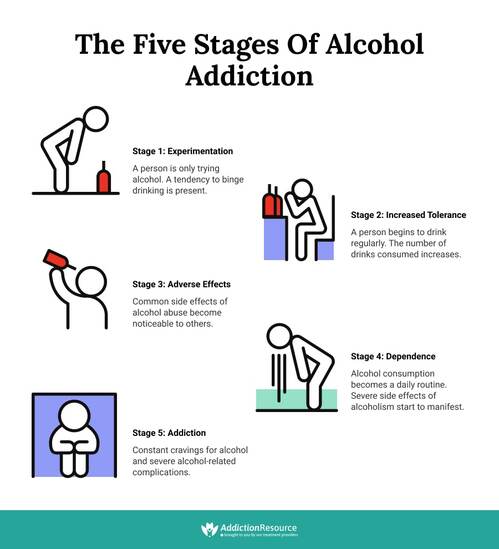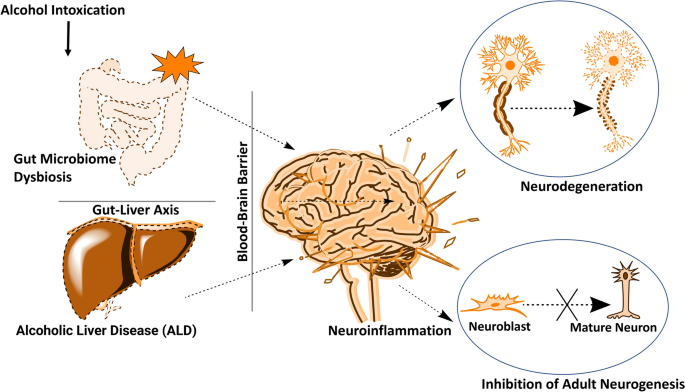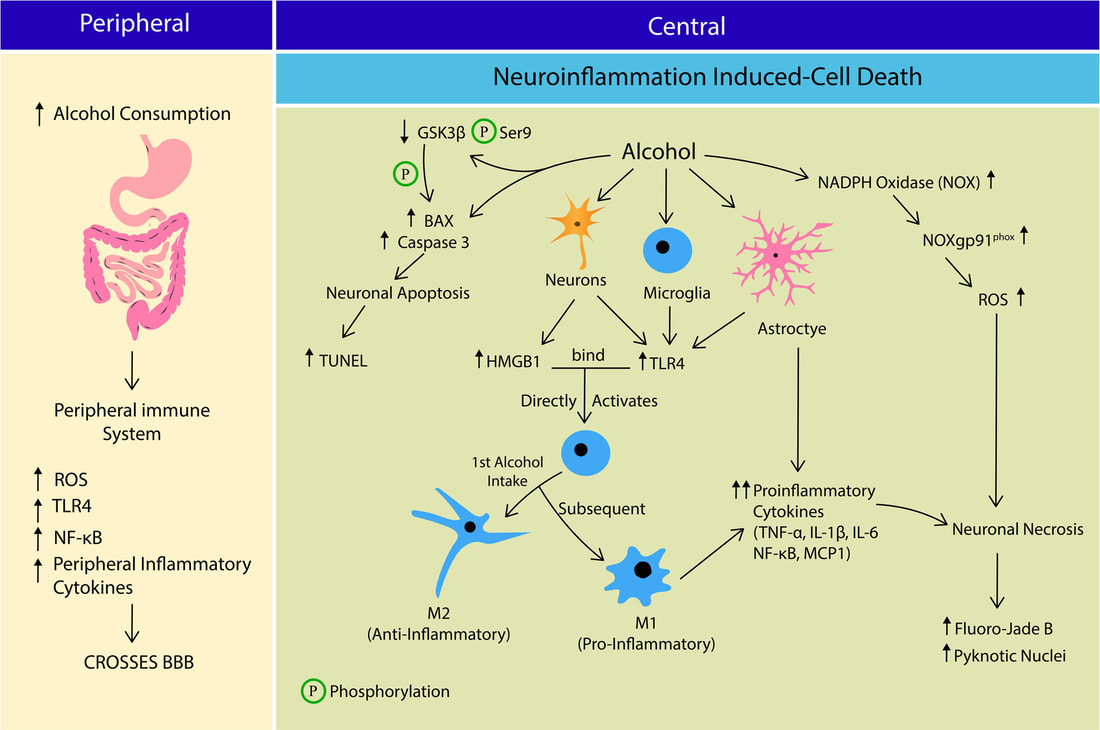What to expect after you stop drinking during the first few weeks.
|
When someone stops drinking after a period of heavy or prolonged alcohol use, their body and mind go through a process of adjustment, which can lead to various physical and psychological symptoms. These symptoms, collectively known as alcohol withdrawal symptoms, can vary in intensity depending on the severity of the person's alcohol dependence and other individual factors.
Please check out this resource from Monument regarding the stages of Alcohol Recovery Timeline: What To Expect When You Quit Drinking Neurogenesis and the healing of the brain
When someone quits drinking alcohol, especially after a period of heavy or chronic drinking, the brain undergoes various changes as it begins to recover from the effects of alcohol. One notable aspect of this recovery is the potential rebuilding of gray matter in the brain.Gray matter refers to the regions of the brain that contain neuronal cell bodies, dendrites, and synapses, where information processing primarily occurs. Chronic alcohol consumption has been associated with reductions in gray matter volume in certain brain regions, particularly those involved in cognitive functions such as memory, decision-making, and emotional regulation.
When a person stops drinking alcohol, several processes contribute to the potential rebuilding of gray matter: Neurogenesis: This refers to the generation of new neurons in the brain. While traditionally it was believed that neurogenesis primarily occurred during early development, research has shown that certain regions of the adult brain, such as the hippocampus, can generate new neurons throughout life. Stopping alcohol consumption may promote neurogenesis, leading to the formation of new neurons and contributing to the restoration of gray matter volume. Synaptogenesis: Synaptogenesis is the formation of new synapses, the connections between neurons. Alcohol abuse can disrupt synaptic connections in the brain, leading to impaired neuronal communication. After quitting alcohol, the brain may undergo a process of synaptogenesis, where new synapses are formed, facilitating improved communication between neurons and contributing to the recovery of gray matter. Reduced Neuroinflammation: Chronic alcohol consumption can trigger inflammation in the brain, which can contribute to neuronal damage and loss of gray matter. When alcohol intake ceases, the inflammatory response in the brain may decrease, allowing for the repair and regeneration of neuronal tissue. Improved Blood Flow and Oxygenation: Alcohol abuse can impair blood flow to the brain, leading to decreased oxygenation and nutrient delivery to brain cells. Upon cessation of alcohol consumption, blood flow to the brain may improve, providing neurons with the necessary oxygen and nutrients for repair and regeneration. Normalization of Neurotransmitter Levels: Prolonged alcohol consumption can disrupt the balance of neurotransmitters in the brain, affecting mood, cognition, and behavior. As the brain adapts to the absence of alcohol, neurotransmitter levels may gradually normalize, promoting neuronal health and the rebuilding of gray matter. It's important to note that the extent of gray matter recovery after quitting alcohol can vary depending on factors such as the duration and severity of alcohol abuse, individual differences in brain physiology, and the presence of co-occurring medical or psychiatric conditions. Additionally, while the brain has remarkable plasticity and the potential for recovery, some degree of permanent damage may persist in cases of severe and prolonged alcohol abuse. When someone quits drinking alcohol, especially after a period of heavy or chronic drinking, the brain undergoes various changes as it begins to recover from the effects of alcohol. One notable aspect of this recovery is the potential rebuilding of gray matter in the brain. Gray matter refers to the regions of the brain that contain neuronal cell bodies, dendrites, and synapses, where information processing primarily occurs. Chronic alcohol consumption has been associated with reductions in gray matter volume in certain brain regions, particularly those involved in cognitive functions such as memory, decision-making, and emotional regulation. When a person stops drinking alcohol, several processes contribute to the potential rebuilding of gray matter: |
|
Negative symptoms to expect after you stop drinking - scroll down for positive effects
|
Alcohol Cravings: One of the most significant and persistent symptoms of alcohol withdrawal is intense cravings for alcohol. These cravings can be powerful and challenging to resist, especially in the early stages of sobriety.
Anxiety: Feelings of restlessness, nervousness, and anxiety are common during alcohol withdrawal. The brain's neurotransmitter balance is disrupted after alcohol cessation, leading to increased excitability. Depression: Alcohol affects the brain's chemistry, and sudden cessation can lead to a drop in mood-regulating neurotransmitters like serotonin. This can result in feelings of sadness, hopelessness, and depression. Confusion and Foggy Thinking: During the initial withdrawal period, individuals may experience cognitive difficulties, including confusion, poor concentration, and memory problems. This is sometimes referred to as "brain fog." |
|
Fatigue: Withdrawal can cause significant fatigue and lethargy as the body attempts to rebalance its systems without the influence of alcohol.
Irritability: Mood swings and irritability are common during alcohol withdrawal, partly due to changes in brain chemistry and also as a result of coping with intense emotions without alcohol as a numbing agent.
Nausea and Vomiting: Gastrointestinal symptoms, such as nausea and vomiting, can occur as the body detoxifies from alcohol. Alcohol kills important bacteria in the intestines used for proper digestion. According to the National Department of Health - Recent studies have shown that a 3-week abstinence following the removal of alcohol induces a complete recovery of gut barrier function in subjects with AUD who presented with high intestinal permeability.
Sweating and Rapid Heartbeat: Some individuals experience physical symptoms like sweating, an increased heart rate, and a feeling of warmth or flushing.
Insomnia and Disturbed Sleep: Sleep disturbances, including difficulty falling asleep and staying asleep, are common during alcohol withdrawal. You may also "alcohol dreams." These dreams can be about drinking where you may feel like actually drank when you wake up. The dreams can be very life like and vivid.
Craving for Sugar: After quitting alcohol, some individuals might experience a strong craving for sugary foods and beverages. This is because alcohol, particularly alcoholic drinks, contains a significant amount of sugar, and the body may crave it during withdrawal.
It's important to note that alcohol withdrawal can be a serious medical condition, and in some cases, it can lead to severe symptoms like seizures and delirium tremens (DTs). Therefore, it is crucial for individuals who are planning to stop drinking, especially heavy drinkers, to seek medical supervision and support during the withdrawal process. Medical professionals can provide appropriate care, monitor for any complications, and manage symptoms effectively through medications and other interventions.
Irritability: Mood swings and irritability are common during alcohol withdrawal, partly due to changes in brain chemistry and also as a result of coping with intense emotions without alcohol as a numbing agent.
Nausea and Vomiting: Gastrointestinal symptoms, such as nausea and vomiting, can occur as the body detoxifies from alcohol. Alcohol kills important bacteria in the intestines used for proper digestion. According to the National Department of Health - Recent studies have shown that a 3-week abstinence following the removal of alcohol induces a complete recovery of gut barrier function in subjects with AUD who presented with high intestinal permeability.
Sweating and Rapid Heartbeat: Some individuals experience physical symptoms like sweating, an increased heart rate, and a feeling of warmth or flushing.
Insomnia and Disturbed Sleep: Sleep disturbances, including difficulty falling asleep and staying asleep, are common during alcohol withdrawal. You may also "alcohol dreams." These dreams can be about drinking where you may feel like actually drank when you wake up. The dreams can be very life like and vivid.
Craving for Sugar: After quitting alcohol, some individuals might experience a strong craving for sugary foods and beverages. This is because alcohol, particularly alcoholic drinks, contains a significant amount of sugar, and the body may crave it during withdrawal.
It's important to note that alcohol withdrawal can be a serious medical condition, and in some cases, it can lead to severe symptoms like seizures and delirium tremens (DTs). Therefore, it is crucial for individuals who are planning to stop drinking, especially heavy drinkers, to seek medical supervision and support during the withdrawal process. Medical professionals can provide appropriate care, monitor for any complications, and manage symptoms effectively through medications and other interventions.
Positive Symptoms to expect after you stop drinking.
Improved Hydration: Alcohol is a diuretic, which means it promotes fluid loss through increased urination. When you stop drinking, your body begins to rehydrate, leading to improved skin complexion, more balanced electrolyte levels, and better overall hydration.
Balanced Blood Sugar Levels: Alcohol consumption can cause fluctuations in blood sugar levels, leading to feelings of fatigue and irritability. After quitting alcohol, blood sugar levels stabilize, and individuals may experience improved energy levels and mood.
Better Sleep Quality: Alcohol disrupts sleep patterns, leading to fragmented and poor-quality sleep. Within the first week of sobriety, individuals often experience more restful and refreshing sleep, leading to increased alertness and better overall cognitive function.
Reduced Inflammation: Chronic alcohol consumption can cause inflammation throughout the body, affecting organs like the liver, pancreas, and brain. Within the first week of quitting alcohol, inflammation starts to decrease, supporting better organ function and overall health.
Balanced Blood Sugar Levels: Alcohol consumption can cause fluctuations in blood sugar levels, leading to feelings of fatigue and irritability. After quitting alcohol, blood sugar levels stabilize, and individuals may experience improved energy levels and mood.
Better Sleep Quality: Alcohol disrupts sleep patterns, leading to fragmented and poor-quality sleep. Within the first week of sobriety, individuals often experience more restful and refreshing sleep, leading to increased alertness and better overall cognitive function.
Reduced Inflammation: Chronic alcohol consumption can cause inflammation throughout the body, affecting organs like the liver, pancreas, and brain. Within the first week of quitting alcohol, inflammation starts to decrease, supporting better organ function and overall health.
|
Weight Loss or Management: Alcoholic beverages are calorie-dense and often lead to weight gain. By cutting out alcohol, individuals may start to experience weight loss or better weight management, especially if they previously consumed a significant number of calories from alcohol.
Clearer Skin: Alcohol can dehydrate the skin and contribute to skin problems like acne and redness. After quitting alcohol, improved hydration and reduced inflammation can lead to clearer and healthier-looking skin. Improved Digestion: Alcohol can irritate the digestive system and lead to issues like acid reflux and gastritis. Within the first week of sobriety, digestive discomfort often starts to subside, leading to improved digestion and reduced stomach issues. |
|
Mental Clarity: Alcohol can impair cognitive function and lead to brain fog. Shortly after quitting, individuals often report increased mental clarity, better focus, and improved memory.
Stabilized Mood: Alcohol is a depressant and can negatively impact mood. Within the first week of sobriety, individuals may experience more stable and balanced emotions as their brain chemistry starts to normalize.
Decreased Risk of Accidents: By quitting alcohol, individuals eliminate the impairment it causes, reducing the risk of accidents and injuries. Alcohol creates impulse control issues and quitting drinking improves decision making skills.
Individual experiences may vary, and some people may notice these changes more quickly or gradually than others. Additionally, individuals with a history of heavy or prolonged alcohol use may experience more severe withdrawal symptoms during the first week of sobriety. Seeking medical support during this time can help manage withdrawal symptoms and ensure a safer transition to sobriety.
Stabilized Mood: Alcohol is a depressant and can negatively impact mood. Within the first week of sobriety, individuals may experience more stable and balanced emotions as their brain chemistry starts to normalize.
Decreased Risk of Accidents: By quitting alcohol, individuals eliminate the impairment it causes, reducing the risk of accidents and injuries. Alcohol creates impulse control issues and quitting drinking improves decision making skills.
Individual experiences may vary, and some people may notice these changes more quickly or gradually than others. Additionally, individuals with a history of heavy or prolonged alcohol use may experience more severe withdrawal symptoms during the first week of sobriety. Seeking medical support during this time can help manage withdrawal symptoms and ensure a safer transition to sobriety.


